
Eating insects is still a lot to ask
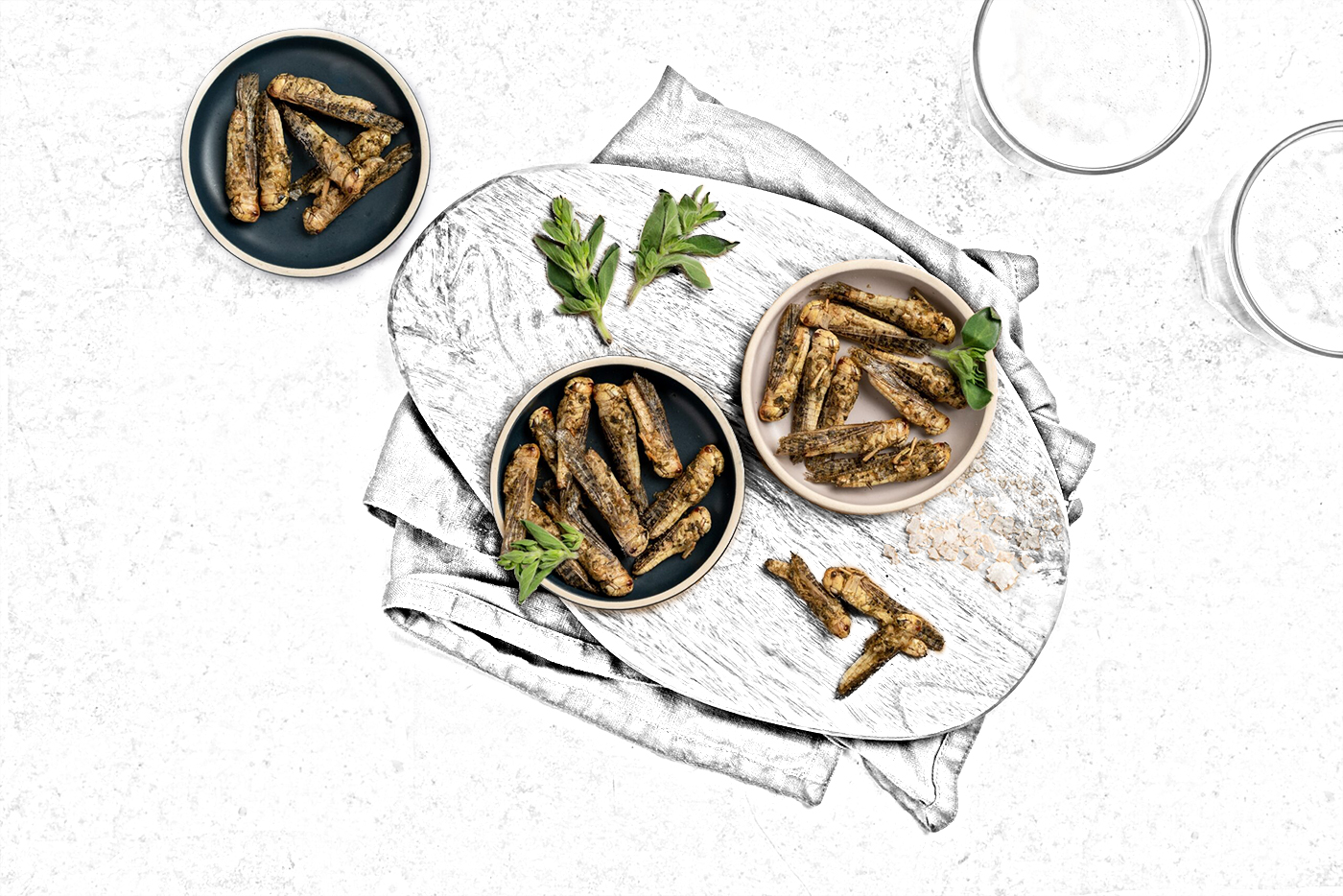
Insects, considered a complete, sustainable and cheap source of protein in Africa and Asia, are having a hard time getting onto Swiss plates, despite Switzerland being the first country in Europe to approve them for human consumption. Our reporter Sara Ibrahim continues her quest for alternative protein sources with an insect taste test.
Anyone switching to a plant-based diet, like me, will start out by obsessing over how much protein they eat. I still do sometimes. Proteins, along with the glucose in carbohydrates, are thought to have helped the human brain evolve rapidly, making our species the most intelligent on the face of the Earth. They are therefore crucial for a healthy diet: our body uses the amino acids that make up proteins, for example, to build and repair muscles and bones.
In Europe, we’re spoiled for choice with plentiful protein sources. But as I explained in previous parts of this series, the overconsumption of meat and dairy products – Europeans’ main protein sources – is a big problem for the environment, as it is the third-largest cause of greenhouse gas emissions. On the other hand, in Africa, proteins are not easily accessible or affordable for many people. There, the search for sustainable yet natural and cheap sources of protein is relentless.
More
I was struck by the storyExternal link of a Zimbabwean businesswoman, Esnath Divasoni, who fights malnutrition in her village by breeding edible insects. The crickets bred by Divasoni, who studied agricultural science, provide high-quality protein for her community. Her example is being emulated by other local women.
According to the United Nations Food and Agriculture Organisation (FAOExternal link), insects could help eradicate world hunger and decrease the dependence of the world’s growing population on intensive farming. Although they are alien to Western culinary culture, as many as two billion people worldwide consume insects. That is why some believe that one day, they will become daily fare even in the West. But in Switzerland – an insect-eating pioneer – this prospect still seems far away.

Insects in a warm room
Insects are very nutritious, contain little fat and all nine essential amino acids. They also contain fibre, which meat lacks, and vitamin B12, which is not naturally present in plant-based foods. Diego Moretti’s researchExternal link in collaboration with the federal technology institute ETH Zurich suggests that insects are also an acceptable source of iron, although they contain less of it than meat.
“In this respect they are more similar to plant-based products,” says Moretti, an expert in human nutrition at the Swiss Distance Learning University of Applied Sciences (FFHS) in Zurich. But he explains that insect proteins are more digestible than those of legumes, for instance, and more complete in terms of their amino acid profile.

On an aesthetic level, insects are no uglier than shrimp or snails. They also emit less greenhouse gas and ammonia than conventional livestock and are easy to breed.
I saw this with my own eyes in Switzerland, which in 2017 was the first country in Europe to allow three types of insects – crickets, locusts and mealworms – to be marketed for human consumption. All you need is a small room, some plastic crates (similar to the fruit crates you see at the supermarket), a substrate of grain and seed powder.
“Insects need very little food and they also need very little space, water and energy,” Benjamin Steiner, a veterinarian who now breeds mealworms, told me. Crickets, for example, need 12 times less feed than cattle, four times less than sheep and half as much as pigs and chickens to produce the same amount of protein, according to an FAO report from 2013External link.
‘Fantastic animals’
In 2018 Steiner set up his company Ensectable on his family’s farm in the small town of Endingen, northern Switzerland. Forget huge stables and hectares of land, with animals, strong smells and hay everywhere: this farm consists of three small rooms, where insects mate and larvae grow before Steiner and his single employee collect them.
Steiner seems to have a kind of admiration for his insects. He speaks of their qualities with a good-natured smile. “Mealworms are really fantastic animals. When they have nothing to eat, they simply wait for better times to come.”
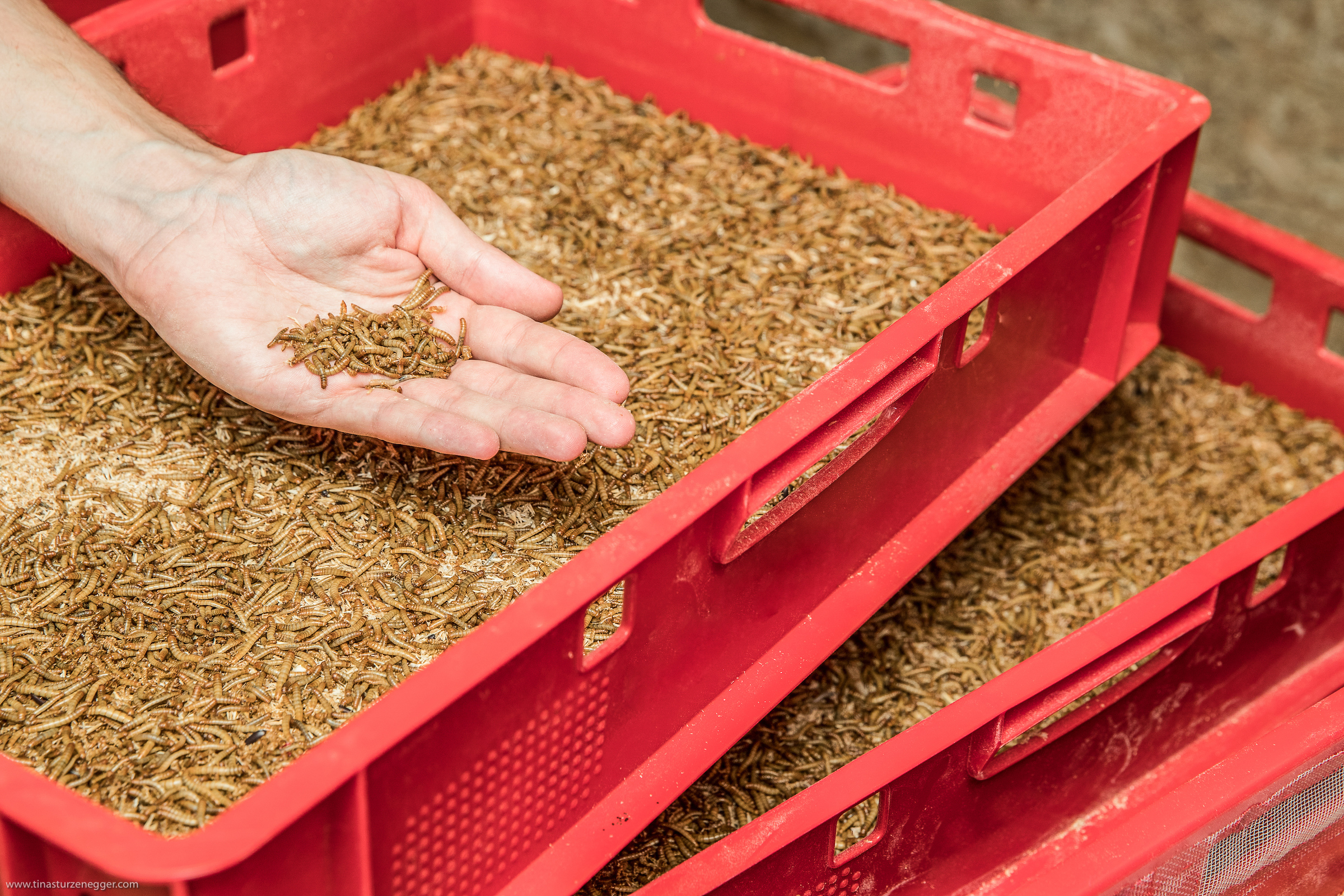
Mealworms need heat to grow faster – the ideal temperature is 25-27°C, which Steiner can conveniently control remotely. When it gets colder, the larvae eat less and their metabolism slows down. “If I want to go on holiday, all I have to do is lower the temperature and the larvae stay quiet until I get back,” he says. It’s a luxury that farmers of cows, pigs and other farm animals cannot afford.
The riskiest moment comes when the mealworms are harvested, because they must be taken out before turning into pupae, the stage that precedes the adult stage. This happens at about ten weeks. After that, they are passed through a machine that separates them from the floury substrate, killed in boiling water and frozen at -20°C. These steps must be carried out by law to ensure that all larvae are dead and do not contain pathogens.
“In theory, this would not be necessary, because the bacteria that the insects have in their intestines are not harmful to humans,” says Steiner.
>>> This video shows how technology is changing the food we eat:
Insects on the market
Steiner manages to produce around 200 kilograms of insects per month, a modest amount that does not allow for cost savings. Ensectable’s main customer, the Swiss start-up Essento, sells a 170-gram pack of flour moth burgers at CHF6.95 ($7) – more expensive than most meat and vegetable burgers.
Admittedly, insects are not a vegan food and neither do they necessarily meet the tastes of meat lovers, at least in Europe. But Essento’s founder Christian Bärtsch believes that they will be in our future.

The somewhat shy young entrepreneur has a background in economics and a passion for food. He tells me with conviction that the winning diet model does not exclude animal protein altogether and that insects are the link between plant-based and carnivorous diets.
“Who am I to say that one food should be completely eradicated rather than another? It is proven that a healthy diet consists of different protein sources,” he says. “We can provide a sustainable, high-quality alternative that can be easily integrated into the diet.”
His Zurich-based company has been selling insect snacks, energy bars and burgers in Swiss, German and Austrian shops and restaurants since 2017. Bärtsch is also directly invested in Ensectable as a co-founder, because he wants to follow the entire production chain.
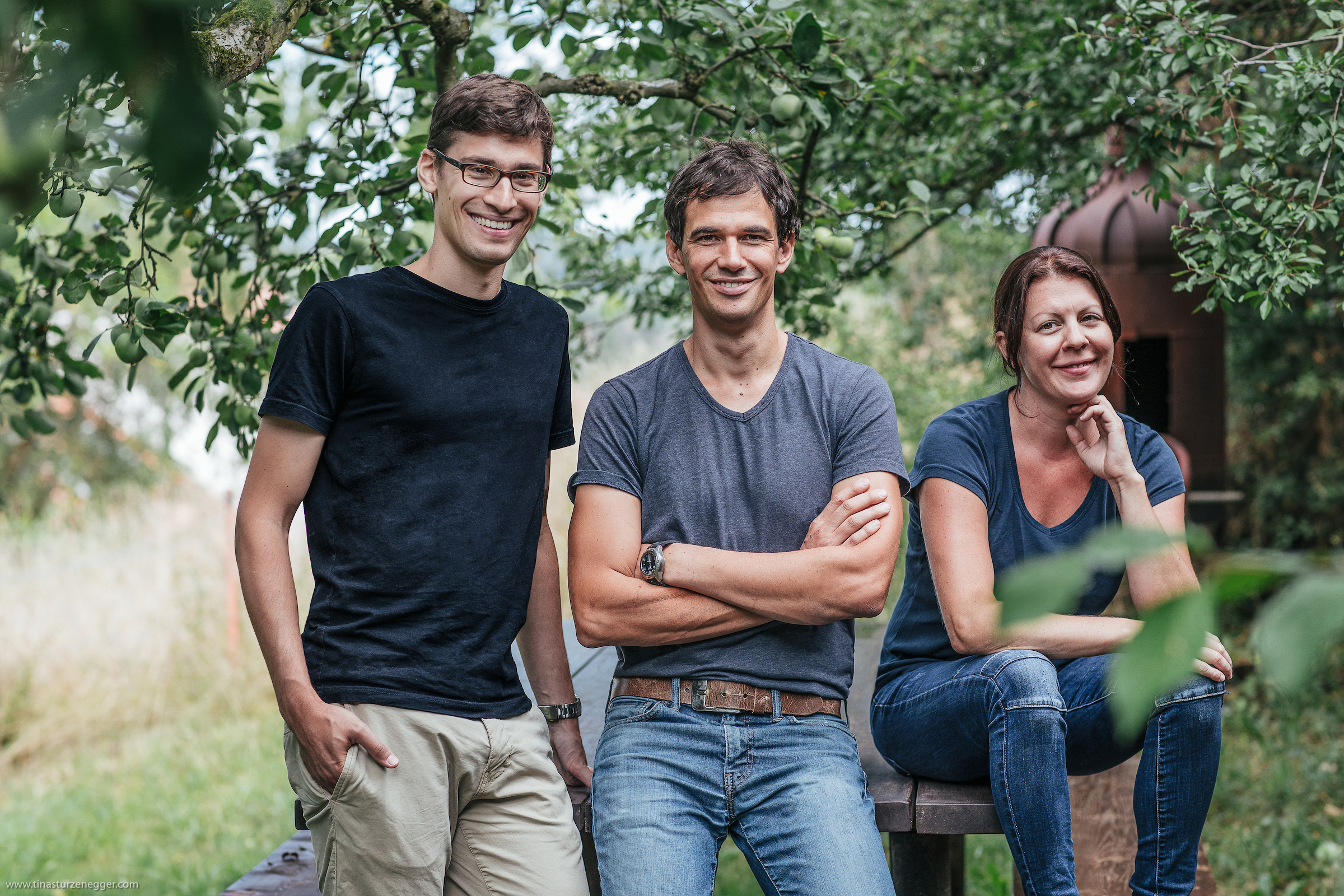
Put to the taste test
The truth, however, is that for many of us the thought of eating an insect is disgusting. A market surveyExternal link from 2018 showed that only about 9% of the Swiss population approved of eating insects. But Bärtsch says it again and again: it’s all in our heads; it’s a question of mentality.
“It’s all in my head,” I whisper as I open the packet of insect snacks I just bought. I had to go to three supermarkets to find them. Even the shop assistant was puzzled when I asked about edible insects. She laughed nervously, as if she had been caught on candid camera. “Insects?”
When she realised I was serious, she went to her manager, who told me that I would only find a reduced selection of snacks and that they no longer stock flour moth burgers because no one was buying them. As expected, the bill was steep: CHF17.50 for three 15-gram packs of crickets and locusts in various flavours and two energy bars of 35 grams each.
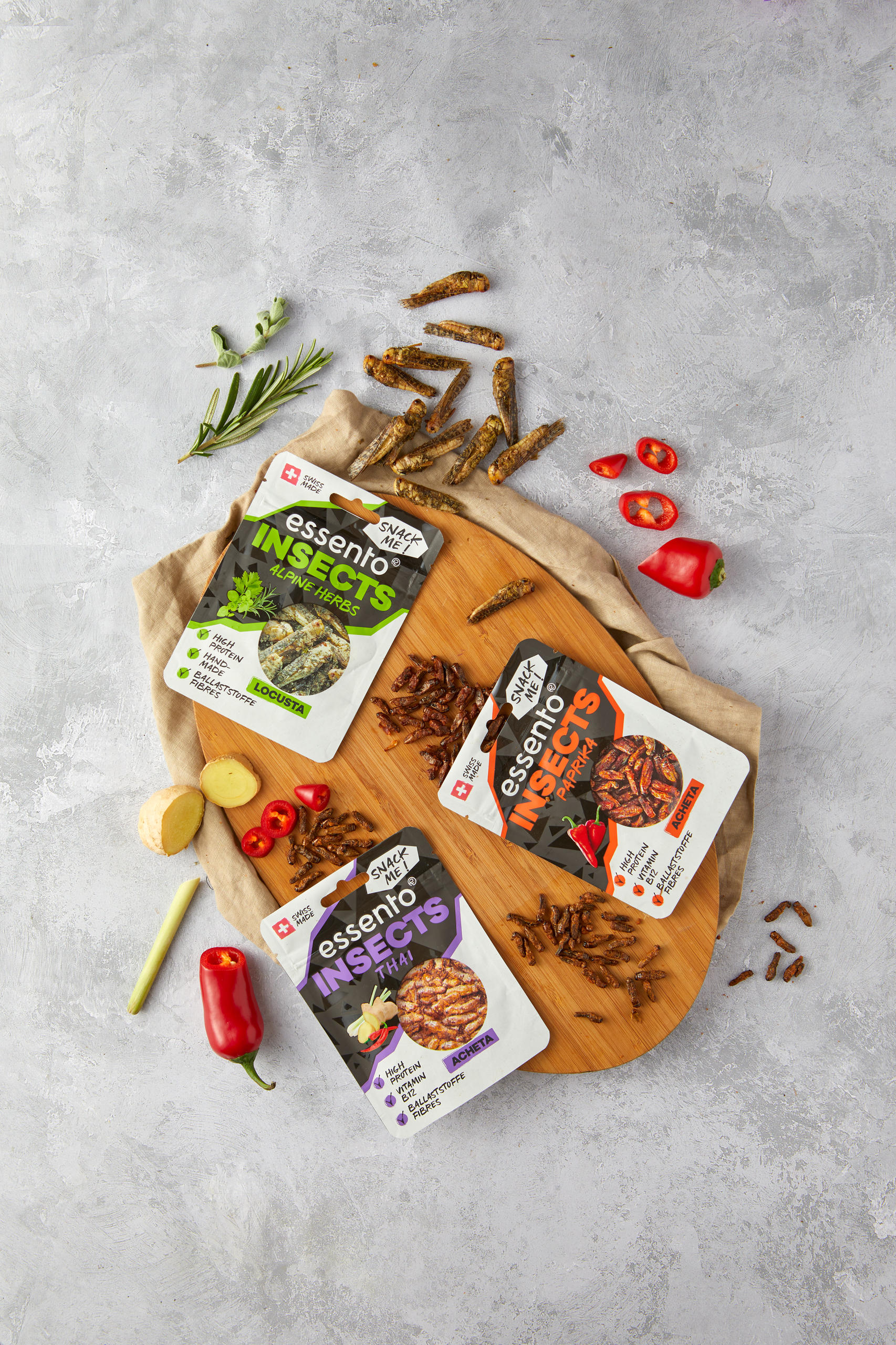
As I paid, I thought about the FAO report and Divasoni’s story and wondered how it’s possible to eradicate world hunger at these prices. But I remembered that Bärtsch had told me over the phone a few months earlier that production processes are becoming more efficient and prices are coming down.
“It will take time to reach the levels of the meat sector but we are making progress,” he had said.
So I decide to try a “Thai-flavoured” cricket from Essento, also involving my husband in the culinary experiment. The appearance is not too bad. The crickets crunch between your teeth just like any salty snack. The taste of the insect is totally masked by a long list of natural spices and sugars. When I switch to the Alpine herb-flavoured locusts, the ingredients don’t change much, but the words “remove hind legs before consumption” on the packaging turn something in my stomach. I pluck up courage and open the packet, but the red eyes of the locusts make me wince.
“You’ve eaten worse! No more prejudice!” I hastily conclude, reviewing in my mind all the unsightly foods I had tried before converting to veganism: tripe, tongues, brains of various animals and fried frogs.
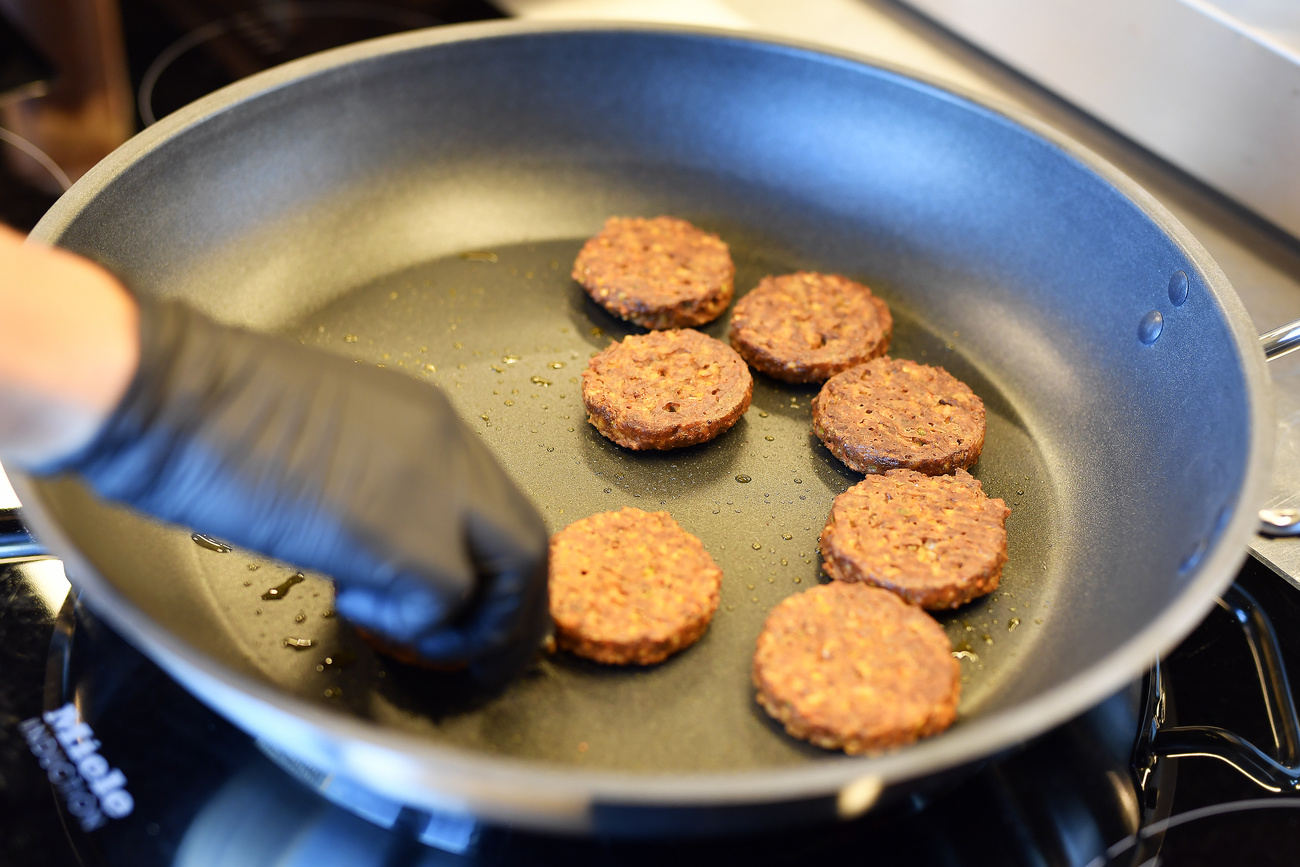
I feel the locust’s wings crunch and splinter as I bite down, and try to focus on the fabulous protein intake, imagining that I’m eating a crisp, while my husband looks at me in amusement. He then puts a handful of crickets in his mouth and swallows them without much thought.
The energy bars, on the other hand, are really good: the crickets are reduced to a powder and there are no added sugars. “Good,” I exclaim, while I ponder how to get rid of the rest of the flavoured insects.
I realise that on this side of the Mediterranean and the Caspian Sea, the path to insect-based cuisine remains a long one. But considering the history of potatoes, it’s not entirely hopeless: in the 1500s, most people found potatoes repulsive and fed them to pigs.
“My grandfather’s generation would never have eaten pizza or sushi. It takes a long time to convince consumers,” says nutrition expert Moretti. Somehow, I feel heartened. But the insects are still in the larder.
To contact me or comment on this article, you can email me.
Follow me on Twitter.External link
Edited by Veronica DeVore
Subscribe to our science newsletter below to get regular insights on these and other science-related topics out of Switzerland, delivered to your inbox.

In compliance with the JTI standards
More: SWI swissinfo.ch certified by the Journalism Trust Initiative
















![The four-metre-long painting "Sonntag der Bergbauern" [Sunday of the Mountain Farmers, 1923-24/26] had to be removed by a crane from the German Chancellery in Berlin for the exhibition in Bern.](https://www.swissinfo.ch/content/wp-content/uploads/sites/13/2025/12/01_Pressebild_KirchnerxKirchner.jpg?ver=cb688ed5)










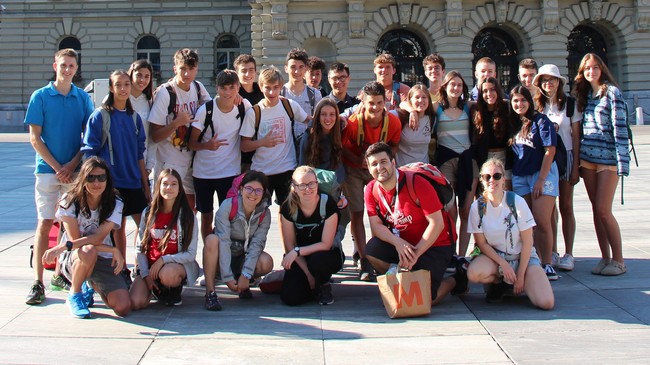




You can find an overview of ongoing debates with our journalists here . Please join us!
If you want to start a conversation about a topic raised in this article or want to report factual errors, email us at english@swissinfo.ch.